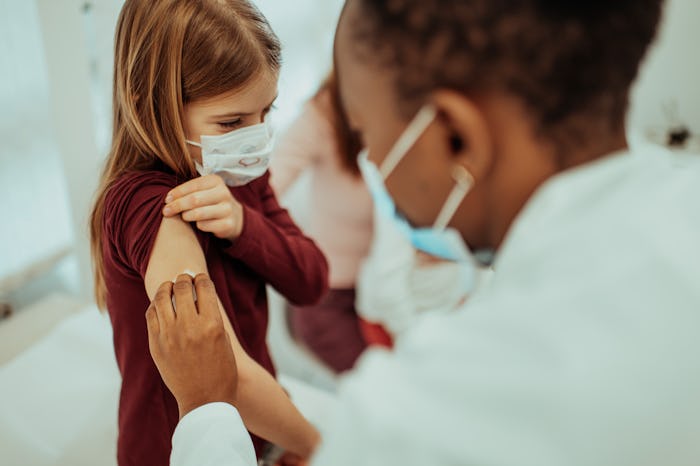Coronavirus

Children As Young As 6 Are Now Included In A COVID-19 Vaccine Trial
The AAP has previously stressed the importance of including children in trials for "potentially life-saving vaccines."
Children under the age of 16 may soon be able to obtain a COVID-19 vaccine as a number of universities are launching pediatric COVID-19 vaccine trials. Currently, neither of the two COVID-19 vaccines authorized for use in the United States are available to children and young adolescents. But health experts hope that, in time, young children will have access to a safe vaccine to further bring the threat of coronavirus down.
Oxford University has enrolled 300 children between the ages of 6 and 17 in a vaccine trial that will see at least 240 of those children receive the AstraZeneca COVID-19 vaccine, The Washington Post has reported. The remaining children in the trial will be given a control vaccine (for meningitis) that is said to mimic the side effects of a COVID vaccine. According to the paper, Oxford began testing the vaccine on children last week, kicking off a trial believed to include the youngest age group to ever test a COVID-19 vaccine: 6-year-olds.
The AstraZeneca vaccine was invented by Oxford University and Vaccitech, a biotechnology company that was spun out from Oxford's Jenner Institute for Vaccine Research. While the AstraZeneca COVID-19 vaccine has not yet been authorized for use on adults in the United States, nearly 50 countries have approved it, including the United Kingdom and a number of countries in the European Union and Latin America. According to The Washington Post, U.S. regulators are seeking more trial data before potentially approving the AstraZeneca vaccine.
But Oxford University isn't the only institution set to test COVID-19 vaccines on children. Cincinnati Children's Hospital began testing the Pfizer COVID-19 vaccine in children ages 12 to 17 in October, WCPO reported. Duke University also began testing Pfizer’s COVID-19 vaccine on roughly 2,000 kids age 12 to 15 earlier this year. "It was definitely a great opportunity for something that I could do during the pandemic," 12-year-old Caleb Chung recently told CNN about participating in Duke's Pfizer trial. "Being able to participate in this vaccine trial was definitely something amazing that I could do to help out."
A similar trial is being organized for the Moderna vaccine. And more recently, Washington University in St. Louis has begun seeking parents and legal guardians interested in having their child participate in "upcoming pediatric COVID-19 vaccine clinical trials." Trials will begin sometime in March or April, The St. Louis Post-Dispatch reported.
Washington University's online vaccine trial application does not state an age range for its upcoming trials so it is unclear if it will include children under the age of 6. Whatever the age range included in the university's trials, health experts agree it's important that children be included in COVID-19 vaccine trials.
"It's important to evaluate the vaccines in children to ensure that if they are used, the immune responses, the protection, will be as good as what has been seen in adults," Dr. David Hunstad, one of the researchers leading trials at Washington University who also serves as chief of pediatric infectious diseases at Washington University School of Medicine and St. Louis Children's Hospital, told The St. Louis Post-Dispatch.
The American Academy of Pediatrics (AAP) has been calling on COVID vaccine manufacturers to include children in their trials since November of last year, noting that their exclusion comes at a heavy cost to children. "If we do not add children to these research trials very soon, there will be a significant delay in when children are able to access potentially life-saving vaccines," AAP President Dr. Sara "Sally" H. Goza said in a press release. "This is unconscionable."
According to Goza, children have already suffered major disruptions to their education and social lives and reduced access to vital medical services as a result of the pandemic, leading to increased harm to their mental and emotional health. AAP has reported that more than 3 million children have tested positive for COVID-19 since the pandemic began.
If you think you’re showing symptoms of coronavirus, which include fever, shortness of breath, and cough, call your doctor before going to get tested. If you’re anxious about the virus’s spread in your community, visit the CDC for up-to-date information and resources, or seek out mental health support. You can find all of Romper’s parents + coronavirus coverage here.